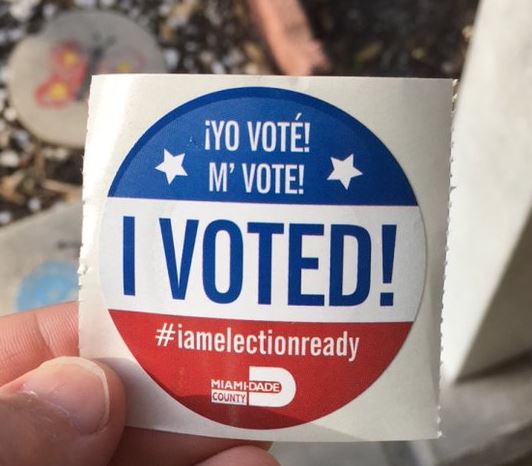VERO BEACH, Fla. (AP) — A felon serving time in the Indian River County Jail voted by mail in the Nov. 8 election because Florida’s cumbersome system for purging felons from the voter registration rolls had not yet caught up with him.
A Treasure Coast Newspapers investigation found no other instances of questionable voting on the Treasure Coast and elections supervisors in Martin, St. Lucie and Indian River counties said they received no official complaints about voter fraud in the November election.
State law bars felons from voting, unless their voting rights have been restored by the state Office of Executive Clemency. It is a third-degree felony, punishable by up to five years in prison, for someone to vote when they know they are not legally qualified.
State law calls for a variety of agencies — such as the court clerk in each county, the state Department of Corrections, the Florida Department of Law Enforcement, and the U.S. Attorney’s Offices, among others — to report felony convictions to the Department of State. If a felon is registered to vote, the department’s Bureau of Voter Registration Services notifies the county elections supervisor.
The supervisors must try to notify the felon he or she is potentially ineligible to vote so they have a chance to appeal. The process could take as long as 65 days if the felon doesn’t respond to an official letter and a newspaper ad.
Indian River County Supervisor of Elections Leslie Swan said her office sent mail ballots to the two felons at the county jail because the state had not yet notified her about their status.
Deszi Marquis Hayes of Vero Beach, who is serving nine-months in jail for a felony traffic conviction, submitted a vote-by-mail ballot to the Supervisor of Elections Office.
Hayes’ ballot was processed and votes counted like all the other mail ballots the office received, as Hayes still is legally registered to vote.
State Attorney Bruce Colton said Hayes told an investigator he believed he voted legally because his voting rights had been restored in 2008 after he was granted clemency for several earlier felonies.
“We are not prosecuting him,” Colton said. “He made no secret of the fact he voted. In his mind, even though he had been convicted of this felony, he somehow thought the clemency overruled that. It’s a little bit of a stretch, but we would have to show beyond a reasonable doubt the guy knew he did not have the right to vote and voted anyway.”
?The state restored Hayes’ voting rights on Sept. 15, 2008, records show. Hayes had seven felony convictions in Indian River County between 1997 and 2005, mainly for habitually driving with a suspended or revoked license.
St. Lucie County Sheriff Ken Mascara and Martin County sheriff’s Maj. Casey Szparaga said jail inmates are free to request vote-by-mail ballots, but jail personnel do not get involved in the process.
A total of 11 St. Lucie County jail inmates returned mail ballots, but two were not counted because felony records made them ineligible, said Sherrie Williams, an elections administrator. She did not say how they realized the felons attempted to vote.
No Martin County jail inmates returned mail ballots, said Debbie Dent, chief deputy elections supervisor in Martin County. And no felons have been caught voting in recent years.
Copyright 2024 The Associated Press. All rights reserved. This material may not be published, broadcast, rewritten or redistributed.

